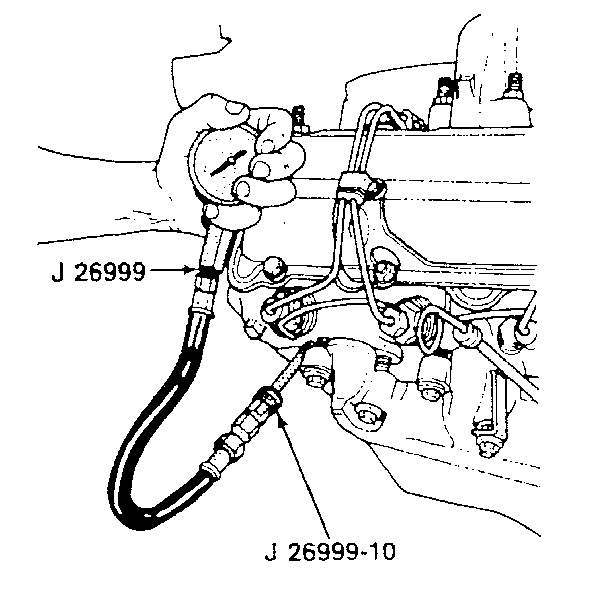Tools Required
- Ensure that the vehicle's batteries are in good condition, and
fully charged. Refer to
Battery Inspection/Test
in Engine Electrical.
- Operate the vehicle until the engine is at normal operating temperature.
- Check the engine cranking speed. The minimum cranking speed specification
must be met to obtain valid test results. Refer to
Engine Cranking Speed Test
.
- Remove the fuel solenoid driver fuse.
- Using the J 41515-A
Glow Plug Socket, remove all eight glow plugs. All eight glow plugs
must be removed from the engine during each cylinder test to obtain valid
test results.

Notice: Do not add oil to any cylinder during a compression test as extensive
engine damage may result.
- Install the J 26999-10
Compression Gauge Adapter, or the J 26999-30
Compression Gauge Adapter, as appropriate, in the glow plug
hole for the cylinder that is being checked.
- Connect the J 26999
Compression Gauge to the Compression Gauge Adapter.
- Using the vehicle's starter motor, rotate (crank) the engine for
ten compression strokes (puffs) for the cylinder being tested. If the engine
rotates for more than ten compression strokes, re-test the cylinder.
| • | Normal: The compression builds up quickly and evenly to the minimum
specified compression. |
| • | Leaking: The compression is low on the first compression stroke.
The compression builds up on the following compression strokes but does not
reach the minimum specified compression. |
- Record the compression reading.
- Disconnect the Compression Gauge from the Compression Gauge Adapter.
- Remove the Compression Gauge Adapter.
- Repeat steps 5 through 11 for all remaining cylinders. All eight
cylinders must be tested to obtain valid test results.
- Check the compression readings. Refer to
Engine Mechanical Specifications
.
- If one or more cylinders fails to meet the minimum specified compression,
repair or replace damaged or malfunctioning components and retest.
- Using the J 41515-A
Glow Plug Socket, install all eight glow plugs.
- Install the fuel solenoid driver fuse.

